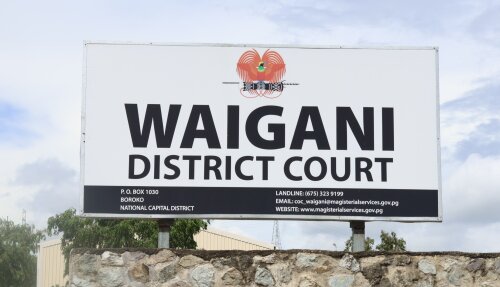Best Marriage Lawyers in Papua New Guinea
Share your needs with us, get contacted by law firms.
Free. Takes 2 min.
Free Guide to Hiring a Family Lawyer
Or refine your search by selecting a city:
List of the best lawyers in Papua New Guinea
About Marriage Law in Papua New Guinea
Marriage in Papua New Guinea is chiefly governed by the Marriage Act and customary laws pertinent to the diverse cultural groups within the country. The legal framework provides for civil, church, and customary marriages. Civil marriages are conducted under the national legal system, while church and customary marriages are recognized under certain conditions. It's important to note that marriage laws respect the customs and traditions of Papua New Guinea's many ethnic groups, which can vary significantly across regions.
Why You May Need a Lawyer
Individuals may require legal assistance in marriage-related issues for numerous reasons:
- Marriage Registration: Understanding and fulfilling the legal requirements of registering a marriage.
- Consent Issues: Resolving disputes regarding the consent required for marriage, especially in the context of customary practices.
- Marital Property: Navigating the complexities of property division, especially in inter-cultural marriages.
- Divorce and Annulment: Guidance through the legal process of divorce or annulment, including custody matters.
- International Marriages: Addressing issues that arise from marriages involving parties from different countries.
Local Laws Overview
Marriage laws in Papua New Guinea encompass both statutory and customary regulations:
- Civil Marriages: Governed by the national legal framework, requiring official registration and proper legal documentation.
- Customary Marriages: Recognized by the state if they comply with the customs of the parties involved and must be registered.
- Age Requirement: The legal age for marriage is 21 years, though individuals aged 16 and above may marry with parental consent.
- Polygamy: Recognized under customary law but not under civil law, leading to potential legal complications.
- Divorce and Separation: Governed by the Matrimonial Causes Act, which outlines provisions for the dissolution of marriage.
Frequently Asked Questions
What is the legal age for marriage in Papua New Guinea?
The legal age for marriage is 21 years. However, with parental consent, individuals as young as 16 may marry.
Are customary marriages legally recognized?
Yes, customary marriages are recognized if they are registered and adhere to the customs governing the marriage ceremony.
Is polygamy legal in Papua New Guinea?
Polygamy is recognized under customary law but is not acknowledged in civil marriages.
How do I register a marriage in Papua New Guinea?
Marriage registration should be undertaken at the Civil Registry Office. Proper documentation and adherence to legal requirements are necessary.
Can foreigners marry in Papua New Guinea?
Yes, foreigners can marry in Papua New Guinea. They must comply with local laws and provide necessary documentation such as passports and proof of single status.
What laws govern divorce in Papua New Guinea?
The Matrimonial Causes Act governs divorce proceedings. Couples should seek legal advice to understand their rights and obligations.
What are the grounds for divorce?
Grounds for divorce include adultery, cruelty, desertion, among others, as stipulated by the Matrimonial Causes Act.
Do I need a lawyer for a customary marriage?
While not mandatory, consulting a lawyer can help ensure that the marriage complies with both customary and legal requirements.
What happens to property in the event of a divorce?
Property division is determined by both statutory and customary considerations and can vary based on the nature of the marriage.
Is parental consent required for marriage under 21 years?
Yes, individuals under 21 years require parental consent to marry legally.
Additional Resources
Some helpful resources and organizations include:
- Department of Justice and Attorney General: Offers guidance on civil marriages and legal documentation.
- Civil Registry: Responsible for the registration of marriages and issuance of marriage certificates.
- Local Courts: Assist in resolving disputes related to customary marriages.
- Non-Governmental Organizations (NGOs): Often provide support and legal aid services related to marriage and family law.
Next Steps
If you require legal assistance in matters of marriage, consider the following steps:
- Consult a Lawyer: Seek a lawyer with experience in marriage law to understand your rights and obligations.
- Gather Documentation: Ensure you have all necessary documents related to your marriage, such as certificates and contracts.
- Utilize Local Resources: Reach out to local governmental bodies or NGOs for guidance and support.
- Understand Legal Procedures: Familiarize yourself with the legal processes involved, whether it's marriage registration, seeking a divorce, or resolving a dispute.
Lawzana helps you find the best lawyers and law firms in Papua New Guinea through a curated and pre-screened list of qualified legal professionals. Our platform offers rankings and detailed profiles of attorneys and law firms, allowing you to compare based on practice areas, including Marriage, experience, and client feedback.
Each profile includes a description of the firm's areas of practice, client reviews, team members and partners, year of establishment, spoken languages, office locations, contact information, social media presence, and any published articles or resources. Most firms on our platform speak English and are experienced in both local and international legal matters.
Get a quote from top-rated law firms in Papua New Guinea — quickly, securely, and without unnecessary hassle.
Disclaimer:
The information provided on this page is for general informational purposes only and does not constitute legal advice. While we strive to ensure the accuracy and relevance of the content, legal information may change over time, and interpretations of the law can vary. You should always consult with a qualified legal professional for advice specific to your situation.
We disclaim all liability for actions taken or not taken based on the content of this page. If you believe any information is incorrect or outdated, please contact us, and we will review and update it where appropriate.
Browse marriage law firms by city in Papua New Guinea
Refine your search by selecting a city.











